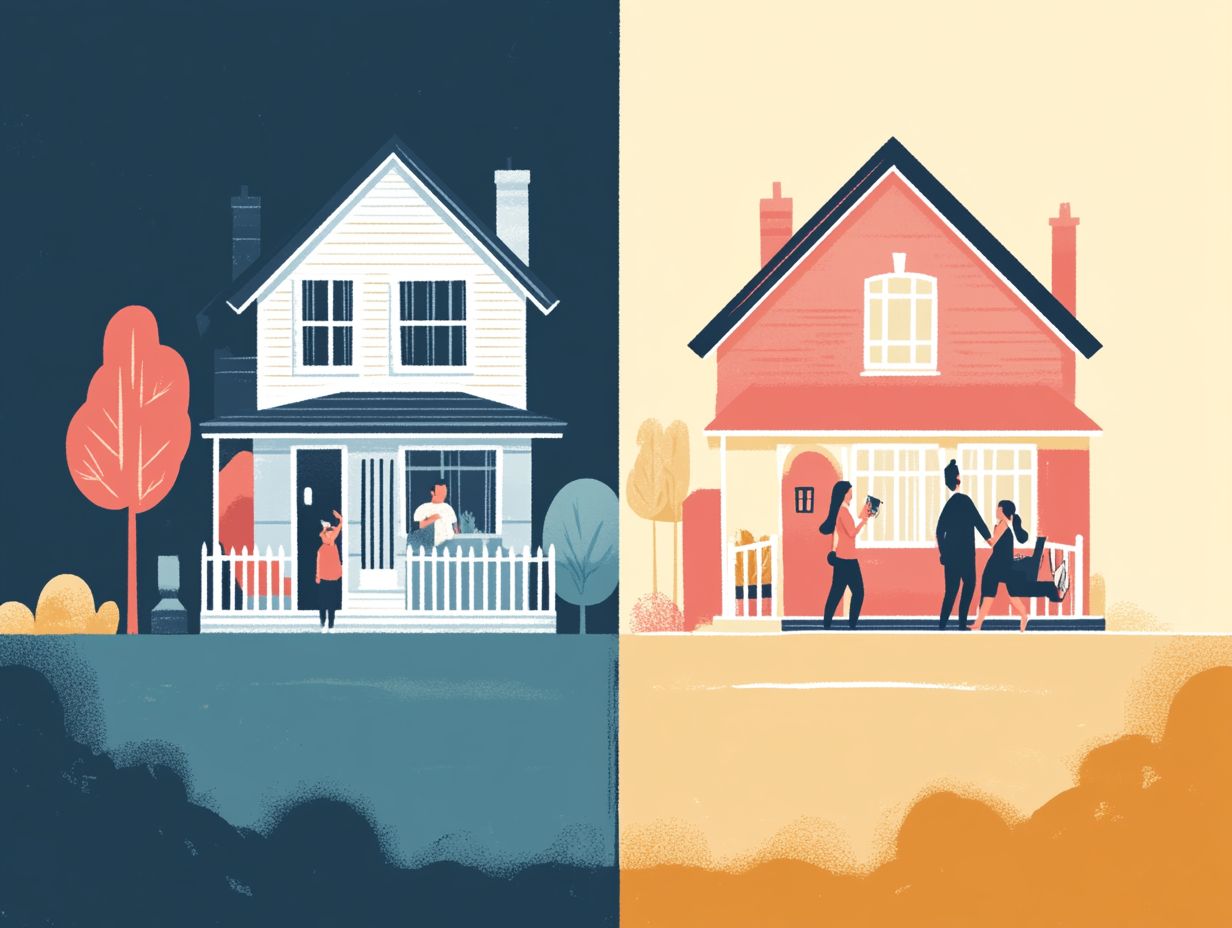What’s the Difference Between Home and Renters Insurance?
Navigating the world of insurance can feel overwhelming, particularly when it comes to choosing between home and renters insurance. Grasping the coverage and benefits of each is essential for protecting your assets and achieving peace of mind.
This article provides a comprehensive breakdown of what you need to know about both types of insurance, emphasizing their key differences and guiding you in selecting the right policy for your unique situation.
By the end, you ll be empowered to make informed decisions about your insurance needs.
Contents
- Key Takeaways:
- Understanding Home Insurance
- Understanding Renters Insurance
- Key Differences Between Home and Renters Insurance
- Which Insurance is Right for You?
- Tips for Choosing the Right Insurance
- Frequently Asked Questions
- What s the Difference Between Home and Renters Insurance?
- What does home insurance cover?
- Which insurance do I need?
- What does renters insurance cover?
- Do I need home insurance if I own my home?
- Do I need renters insurance if I live in an apartment?
- Is the cost of home insurance different from renters insurance?
Key Takeaways:
- Home insurance offers coverage for both property and liability, while renters insurance only covers personal belongings and liability.
- The cost of home insurance is typically higher due to the value of the property being insured, whereas renters insurance is more affordable.
- When deciding between home and renters insurance, consider factors such as the value of your possessions, the level of liability protection you need, and your budget.
Understanding Home Insurance
Homeowners insurance serves as important protection for property owners, offering essential coverage against various risks that could jeopardize your home and personal belongings.
This insurance typically covers the structure of your home, your personal possessions, and liability protection, which shields you from potential legal claims arising from injuries or property damage on your property.
Beyond basic coverage, homeowners insurance can also cover costs for temporary housing if your home becomes uninhabitable due to a covered loss. This ensures that you can maintain peace of mind as you manage your insurance needs.
Coverage and Benefits
Homeowners insurance provides a suite of coverage options designed to offer you financial protection against various risks, ensuring that you can effectively safeguard your investments and personal property.
Among these options, personal property coverage is essential, reimbursing you for the loss or damage of your belongings due to events like theft or natural disasters.
Liability coverage is another critical component, protecting you against claims from injuries or property damage sustained by others on your property, thereby shielding you from potentially crippling legal fees.
Additional living expenses coverage steps in when your home becomes uninhabitable due to covered incidents, allowing you to maintain your standard of living by covering costs like temporary accommodations.
Together, these coverage types create a robust financial safety net, enabling you to navigate unforeseen circumstances with greater confidence.
Understanding Renters Insurance
Renters insurance is a crucial safeguard for anyone renting their home. It protects your personal belongings and provides liability coverage, shielding you from unforeseen events and potential liabilities.
Unlike homeowners insurance, which covers the structure of the home and the owner’s personal possessions, renters insurance focuses on your items, ensuring that if theft, fire, or other disasters strike, you won’t be left high and dry financially.
It can also help cover costs if someone is injured in your rented space. This ensures you have peace of mind.
Coverage and Benefits
Renters insurance offers essential coverage options tailored for tenants, encompassing protection for personal property, liability coverage, and even assistance with additional living expenses in the event of a disaster.
This type of insurance ensures that your valuable belongings think electronics, furniture, and clothing are safeguarded against unforeseen events like theft, fire, or vandalism, providing you with invaluable peace of mind.
Liability coverage is particularly crucial; it protects you should someone sustain an injury in your rental space, helping to cover legal fees and potential medical costs that could otherwise be burdensome.
If you find yourself temporarily displaced due to a covered incident, renters insurance can alleviate financial strain by assisting with additional living expenses, such as accommodation and meals.
It s vital to choose policy limits that adequately reflect your needs, as insufficient coverage may leave you vulnerable. This underscores the importance of a thorough assessment when determining your insurance requirements.
Don’t wait to protect what matters most!
Key Differences Between Home and Renters Insurance

Grasping the essential distinctions between homeowners insurance and renters insurance is crucial for individuals and families seeking the right coverage tailored to their unique needs.
Both types of insurance offer vital protection against property damage and liability. However, they differ significantly in what’s covered. Homeowners insurance includes both the structure of the home and the homeowner’s personal property. In contrast, renters insurance focuses solely on the tenant’s belongings.
Understanding these nuances enables you to make informed decisions about your insurance purchases and policy limits, ensuring you re adequately protected.
Property Coverage
Property coverage is a cornerstone of both homeowners and renters insurance, safeguarding you against losses related to personal belongings from events like theft or damage.
The extent of this coverage can differ remarkably. Homeowners insurance usually covers both your home s structure and your personal belongings, offering a more comprehensive safety net. For example, if a fire damages your home, homeowners insurance would cover repairs and compensate for the loss of personal items.
On the other hand, renters insurance focuses solely on your personal property. If your laptop goes missing, renters insurance would cover that loss. However, any damage to the apartment itself wouldn t be covered.
Typical coverage for personal items ranges from $15,000 to $50,000 for renters, while homeowners often have limits that soar well above that.
To ensure you accurately assess the value of your items, creating an inventory can be invaluable. List each item, its value, and keep receipts whenever possible.
Liability Coverage
Liability coverage is essential in both homeowners and renters insurance. It protects you against legal claims that may arise from injuries or damages occurring on your property.
This safeguard is critical for anyone who owns or rents a residence, as it helps ease the financial burden of lawsuits and potential settlements.
Homeowners insurance usually provides more liability coverage than renters insurance, reflecting the greater responsibility of property ownership.
Both types of insurance typically require you to document the incident, including photographs and witness statements, which can significantly influence the outcome.
Having adequate liability protection is vital. It covers not only medical expenses related to an injury but also potential legal fees, giving you peace of mind as a policyholder.
Cost Differences
The cost of insurance premiums can vary significantly between homeowners and renters insurance, influenced by factors such as:
- Coverage limits
- Location
- Insured value of personal property
For homeowners, premiums often reflect the property’s replacement value and any additional structures on the premises. Renters typically pay less since they aren t insuring the physical dwelling itself.
However, it’s essential to understand your policy limits to avoid the pitfalls of underinsurance, especially in disaster-prone areas. By obtaining accurate quotes, you can secure the best coverage at a competitive rate, granting you peace of mind as you navigate your insurance needs.
Which Insurance is Right for You?
Selecting the appropriate insurance, whether homeowners or renters, hinges significantly on your situation.
Consider factors such as whether you own or rent your residence, the worth of your personal belongings, and your coverage requirements.
Now that you know the differences, assess your needs and choose the right insurance today!
Factors to Consider

When you’re weighing the choice between homeowners insurance and renters insurance, several critical factors come into play. These can significantly impact your coverage and overall insurance costs.
The ownership status of the property is important. If you own your home, you need more coverage to protect your investment. If you re renting, your financial stake is generally lower, which means your insurance needs will be more focused on safeguarding your personal belongings.
It’s also vital to evaluate the value of your personal property. High-value items like electronics or jewelry may need additional coverage, regardless of whether you own or rent.
Don t overlook risks tied to your property’s location, such as the risk of natural disasters or crime rates these can greatly influence the type and cost of your insurance.
Each of these considerations plays a crucial role in guiding your decision-making process when selecting between homeowners, renters, and landlord insurance.
Tips for Choosing the Right Insurance
Choosing the right insurance can be simple and straightforward with the right tips. Homeowners and renters alike can make informed choices that not only meet their unique needs but also offer comprehensive protection.
Assessing Your Needs
Assessing your needs is a crucial step in determining whether homeowners or renters insurance is the right fit for you. It allows you to pinpoint the specific coverage required to safeguard your personal property and liabilities.
By evaluating the value of your belongings, you gain valuable insight into the coverage levels necessary for adequate protection. This process also involves considering potential risks unique to your living situation, such as climate-related threats or crime rates in your area.
Analyzing your financial situation is important, as it helps you understand how much you can comfortably allocate for monthly insurance premiums. This ensures that the policy you choose aligns with your budget.
Ultimately, grasping the costs associated with insurance enables you to make a well-informed decision and protects you from unexpected events that could lead to financial strain.
Comparing Policies
Comparing policies is crucial for selecting the homeowners or renters insurance that best aligns with your unique needs, while also ensuring you receive the best value for your investment.
Act quickly! Gather quotes from several insurers to get the best deal. Taking the time to evaluate various options side by side may reveal important differences in coverage options, policy limits, and premium costs that you might otherwise overlook.
As you review these quotes, pay special attention to the specific coverage exclusions detailed in each policy, as these could significantly affect your experience during difficult times.
This meticulous approach ensures that you find a plan that not only meets your expectations but also effectively protects your assets.
Frequently Asked Questions
What s the Difference Between Home and Renters Insurance?

Home insurance and renters insurance are two types of insurance that provide coverage for your living space and personal belongings. However, there are some key differences between the two.
What does home insurance cover?
Home insurance typically covers the physical structure of your home, as well as your personal belongings and liability for accidents that occur on your property. It can also provide coverage for additional living expenses if your home becomes uninhabitable due to a covered event, such as a fire or natural disaster.
Which insurance do I need?
Assess your circumstances to determine if homeowners or renters insurance is more appropriate for your needs.
Start assessing your insurance options today to protect what matters most!
What does renters insurance cover?
Renters insurance generally covers your personal belongings and liability for accidents in your rental unit. It may also help with living expenses if your unit is uninhabitable. Your landlord’s insurance won t cover your belongings.
Do I need home insurance if I own my home?
Yes, having home insurance is strongly advised for homeowners. Your home is likely your biggest asset, and protecting it from unexpected events is crucial. Mortgage lenders often require home insurance to secure a loan.
Do I need renters insurance if I live in an apartment?
Renters insurance isn’t legally required, but it’s a smart choice for anyone in an apartment. Your landlord s insurance won t protect your belongings or liability. Renters insurance offers essential coverage against theft, damage, or accidents.
Is the cost of home insurance different from renters insurance?
Yes, home insurance usually costs more than renters insurance. Home insurance protects the building itself, a larger and more valuable asset. The cost of both types varies based on location, coverage limits, and deductibles.





